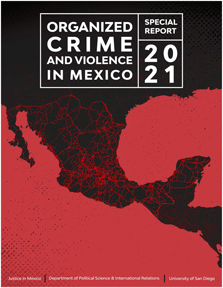Justice in Mexico releases 2021 Organized Crime and Violence in Mexico Report
News Category: News and General Discussion
-
0/22/21- (written by rramos)- Justice in Mexico has released the third edition of Organized Crime and Violence in Mexico, coordinated by Laura Y. Calderón, Kimberly Heinle, Rita E. Kuckertz, Octavio Rodríguez Ferreira, and David A. Shirk. Previously titled Drug Violence in Mexico, the release marks the third consecutive year in which the report has been issued under its current name, in recognition of ongoing shifts in the nature of organized crime. During a consequential period for Mexico, this latest edition of Organized Crime and Violence in Mexico seeks to provide a comprehensive analysis of the country’s dynamic public security situation by compiling key statistics and exploring the broader significance of emerging and persistent trends.
Trends in Violent Crimes
Mexico experienced a slight decrease in homicides in 2020. Data from the Mexican National Security System (Sistema Nacional de Seguridad Pública, SNSP) indicated that 2020 saw a 0.3% decline in the number of homicides compared to the number of homicides in 2019. With data from the first half of 2021 continuing to show modest decreases in the number of homicides, there are indications that the surge in homicides that began in 2015 may be starting to level off. Nevertheless, the number of homicides in Mexico remains at exceptionally high levels.
Additionally, SNSP data showed that the occurrence of other violent crimes, such as extortion, kidnappings, and intentional injuries, decreased in 2020 compared to 2019. However, the report notes that widespread underreporting of crimes, as well as disruptions of data collection activities and reporting mechanisms caused by the COVID-19 pandemic, leaves open the possibility that the actual numbers of crimes committed may be higher than official figures.
Special attention continued to be paid to violence against certain populations, including women and journalists. When combining totals of femicide victims and female victims of intentional homicide, the 2020 daily average of women killed each day was virtually unchanged from the average recorded in 2019. With regards to journalists, Justice in Mexico’s Memoria dataset showed that 2020 was the deadliest year for journalists and media workers, with a 169% increase in killings compared to 2019.
Impact of COVID-19
Reflecting the widespread and unprecedented impact of the COVID-19 pandemic throughout the globe since early 2020, the report features a section dedicated to examining the ways in which COVID-19 and measures to contain the pandemic have affected criminal groups in Mexico. Organized crime networks adjusted to the logistical challenges of supply chain disruptions and limited access to key infrastructure through a variety of methods, including artificially inflating drug prices and withholding shipments in order to maximize revenues and compensate for lost profits. As noted by the report, the impact of COVID-19 on organized crime activities may compel criminal actors to reshape and redesign their illicit operations in the future.
Also of note, criminal organizations demonstrated their ability to exploit economic hardship caused by the pandemic. A number of organized crime groups across the country engaged in delivery of aid packages and similar measures in a bid to attract support within the local communities in which these groups operate. Among those groups that provided humanitarian assistance during the COVID-19 pandemic were some of Mexico’s most well-known criminal organizations, including the Jalisco New Generation Cartel and Sinaloa Cartel.
Mexican Government Responses
The 2021 report also evaluated the potential impacts of certain key policies pursued by the Mexican Government in response to the country’s ongoing security challenges.
Among the topics covered was the continuing role of the National Guard, a critical pillar of President Andrés Manuel López Obrador’s public security strategy. Despite the National Guard’s continued centrality in efforts to address violence and similar measures that point to ongoing militarization of public security, official data indicates that violence and crime have remained at extraordinarily high levels throughout the López Obrador administration.
Moreover, the report touches upon the possible implications of recent developments in security cooperation between Mexico and the United States. In particular, the report delves into the ways in which the December 2020 adoption of changes to the National Security Law (Ley de Seguridad Nacional) may interrupt flows of information between Mexican and U.S. authorities or damage efforts to build trust between the two sides.
Looking ahead
Security and violence in Mexico will remain significant challenges in the foreseeable future. Through a broad, encompassing survey of key data and statistics, Justice in Mexico’s 2021 Organized Crime and Violence in Mexico report seeks to shed further light on the complex trends and patterns influencing the overall trajectory of Mexico’s security situation. Through better understanding of the nature of crime and violence, Justice in Mexico hopes to contribute to efforts to more effectively tackle these issues.


Leave a Reply